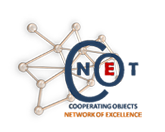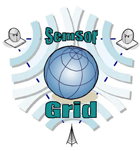1st International Workshop on the Semantic Sensor Web
(SemSensWeb
2009)
June 1st, 2009
Heraklion, Crete, Greece
Collocated with
ESWC 2009
31/5 - 4/6, 2009
Heraklion,
Crete, Greece
The workshop will take place in the conference room called "Clio".
Millions of
sensors are currently been deployed in sensor networks around the globe
and are actively collecting an enormous amount of data. Together with
legacy data sources, specialized software modules (e.g., modules
performing mathematical modeling and simulation) and current Web 2.0
technologies such as mashups, deployed sensor networks give us the
opportunity to develop unique applications in a variety of sectors
(environment, agriculture, health, transportation, surveillance, public
security etc.). The terms Sensor Internet, Sensor Web and Sensor Grid
have recently been used to refer to the combination of sensor networks
and other technologies (Web, service-oriented, Grid and database) with
the view of addressing this opportunity.
Previous
Sensor Internet, Sensor Web and Sensor Grid proposals make very
little use of semantics (e.g., they do not use semantic
annotations, metadata, ontologies etc.) and, in fact, whenever these
proposals do refer to semantic concepts, they do so in an
unprincipled and non-systematic way. On the contrary, the use of explicit semantics for Web and Grid
resources as pioneered by many Semantic
Web and Semantic Grid projects
enables us to overcome the heterogeneity of data and resources, and
to improve tasks like data sharing,
service discovery and composition etc.
In this workshop, we would like to explore
whether the core ideas and technologies of the Semantic Web can also be applied to sensor networks to allow the
development of an open information spacewhich we call the
Semantic Sensor Web. The Semantic Sensor Web unifies the real
and the virtual world by integrating sensor technologies and
Semantic Web technologies. Recent
discussions of the Semantic Sensor Web include the papers:
Participants of the workshop are expected to address
the following research questions that are fundamental for the
realization of the Semantic Sensor Web:
- What extensions are needed to
established Semantic Web data models and languages (e.g., RDF,
SPARQL, OWL etc.) so that we can deal with sensor data and
meta-data? How do we model the temporal, spatial and thematic
dimensions that arise in sensor networks?
- What are
appropriate ontologies for describing sensors,
their processes and products? What are appropriate languages
and tools for semantic annotation of sensors? How can we
leverage existing standards developed by the Sensor Web
Enablement Working Group of the Open Geospatial Consortium such
as SensorML (http://www.opengeospatial.org/standards/sensorml)
or the W3C Geospatial Incubator Group (http://www.w3.org/2005/Incubator/geo/)?
- What are appropriate
principles and architectures for the
semantics-based integration of sensor networks? What kind of
middleware is appropriate for supporting the proposed
architectures?
- What are appropriate techniques and tools for
semantic-based data management over heterogeneous data
streams coming from autonomously deployed sensor networks? Can
we apply semantic data integration techniques as we know it from
database and Semantic Web research? How do these techniques
interact with existing ways of processing (continuous) queries
over sensor networks e.g., in-network data processing?
- How do we develop
open, scalable and fault-tolerant resource discovery
mechanisms for the Semantic Sensor Web? Is there a role for
successful technologies such as P2P networks and publish/subscribe systems here?
- Is it possible to combine
existing techniques for developing mashupswith semantic
technologies and sensor networks to allow the flexible and rapid
development of decision support systems for target application
sectors? What are appropriate high-level APIs
that ease the rapid development of such mashups? Can we build on
already deployed tools such as
SensorMap?
- What are interesting applications of Semantic
Sensor Web in target sectors such as environment, agriculture,
health, transportation, surveillance, public security etc.?
Topics of interest include, but are not limited
to:
-
Data models and languages for the Semantic Sensor Web
-
Architectures and middleware for the Semantic Sensor Web
-
Ontologies and rules for the Semantic Sensor Web
-
Annotation tools for the Semantic Sensor Web
-
Semantic data integration of heterogeneous sensor network data streams
-
Registries for the Semantic Sensor Web
-
Mashup technologies for the Semantic Sensor Web
-
Semantic Sensor Web applications
We invite two kinds of submissions:
- Research papers. These should not exceed 15 pages in length.
- Demos. Deployed technologies (sensors, middleware and mashups) are important if the Semantic Sensor Web is to be realized. We therefore strongly encourage the submission of demos, and the presentation of demos related to research papers (a separate demo paper does not need to be submitted in this case, but the research paper should clearly discuss the demo to be presented).
Demo papers should not exceed 5 pages in length.
Submissions should be formatted according to the Lecture Notes in Compute Science guidelines for proceedings available at http://www.springer.com/computer/lncs?SGWID=0-164-7-72376-0
.
Papers should be submitted in PDF format. Submission is now open :
http://www.easychair.org/conferences/?conf=semsensweb2009
At least one author of each accepted paper or demo must register for the workshop. Information about registration will appear soon on the ESWC 2009 Web page.
CEUR Workshop Proceedings, Volume 468, available at http://www.ceur-ws.org/Vol-468.
- Paper and demo submission: March 8, 2009
- Notification of acceptance/rejection: April 4, 2009
- Camera-ready version due: April 18, 2009
- Oscar Corcho, Ontology
Engineering Group, Universidad Politecnica de Madrid
- Manfred Hauswirth,
Digital Enterprise Research Institute (DERI), Galway
- Manolis Koubarakis,
Department of Informatics & Telecommunications, National and Kapodistrian University of Athens
Michael Compton, CSIRO
Dave de Roure, University of Southampton
Alvaro Fernandes, University of Manchester
Asun Gomez-Perez, Universidad Politecnica de Madrid
Dimitrios Gunopoulos, National and Kapodistrian University of Athens
Stathes Hadjiefthymiades, National and Kapodistrian University of Athens
Vana Kalogeraki, University of California, Riverside
Werner Kuhn, University of Muenster
Srdjan Krco, Ericsson
Kirk Martinez, University of Southampton
Sebastian Michel, EPFL
Norman Paton, University of Manchester
Amit Sheth, Wright State University
Ingo Simonis, Geospatial Research & Consulting
Heiner Stuckenschmidt, University of Mannheim
Kerry Taylor, CSIRO ICT Centre
Andreas Wombacher, University of Twente
Kai-Uwe Sattler, TU Illmenau
The workshop is supported by the following projects:
CONET (FP7, INFSO-ICT-224053),
PECES (FP7, FP7- 224342-ICT-2007-2),
SemsorGrid4Env(FP7-ICT-223913).
|





